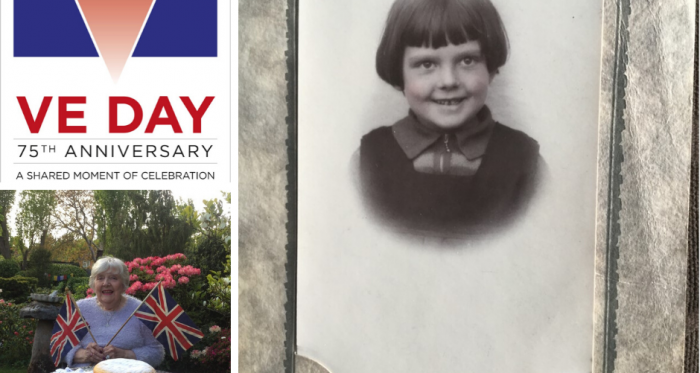
Put Out the Flags: Reflections of School Girl
Friday 8th May is the 75th anniversary of the end of the Second World War in Europe. Although fighting continued elsewhere in the world until the victory over Japan on 15th August, VE Day was a time of great celebration. People had known for months that the Allies would win the war. It was just a question of when. Now the day had finally arrived, people felt happy, excited and relieved all at the same time.
In May 1945, my mum had just turned ten years old. The war had already started before she was old enough to go to school. Imagine that, living through a war all the way from Reception to Form 5, spending nights in the damp air raid shelter, listening to planes droning overhead and bombs whistling down, never really knowing what was going to happen and whether you would be safe. My grandfather dug up the back garden to grow vegetables and kept chickens, but food was tightly rationed. My mum told me that a girl, whose brother was in the navy, once brought an orange into school. The orange was passed around the class like a precious stone and, after the teacher had carefully peeled it and given the juicy part back to the girl for her snack, all the other children were given a tiny piece of the peel to eat. That was the only time my mum saw an orange for the whole of the war.
On 7th May, the day before VE Day, the teacher announced that the next day would be a holiday to mark the end of the war in Europe. The children were so excited it was hard to concentrate on work that morning. In those days, everyone went home for lunch even if, like my mum, their parents were out at work. She had her dinner at a neighbour’s house but, before returning to school, she and her friend decided that it was such an important occasion they should make the effort to dress up. They were quite sure everyone would do the same, so they put on their mums’ best summer dresses, with strings of pearls and high-heeled shoes and tottered back to school for afternoon lessons. When they arrived in class, everyone stared at them, including the teacher, Miss Thomas. All the other children were prim and proper in their normal school clothes, and mum and her friend spent the rest of the day feeling rather foolish. I think it would be a bit like forgetting it is non uniform day at Eversfield and getting that sinking feeling when you cross the playground in your blazer.
The government said that 8th May was to be a Bank Holiday, even though it was a Tuesday, so families could celebrate the end of the war together. Most of my mum’s family lived in Ladywood, not far from the centre of Birmingham, and in the morning she and her parents travelled all the way across the city, taking two long bus rides, to be with them. Before they set off, my grandfather hung an enormous Union Jack flag out of the upstairs window of the house, with two smaller flags on either side.
When they finally arrived, the first thing that my mum and her parents saw was a huge bonfire in the street. It was almost as tall as the houses and was piled high with firewood and bits of broken furniture. On the top was perched an effigy of Hitler, dressed up in someone’s old suit and looking very sorry for himself indeed. People were setting up tables in the street. Everyone had scraped together their rations to make a feast of cakes and plates of sandwiches for the party. Someone had even wheeled out a piano ready for a sing-along.
As it got dark, attention turned to the bonfire. Everyone cheered as the flames soared into the sky, engulfing the effigy of Hitler in his shabby suit. It was the first time my mum had seen bright light at night for almost six years. Everyone had a great time but, even so, the evening was tinged with sadness for some because so many people had died in the war. In particular, my grandfather remembered his brother Harry, who had been killed in Italy in 1944, and raised a glass to him.
The large Union Jack that my grandfather hung out of the window was old and soon either got lost or fell apart, but the two smaller flags were carefully rolled up and put away. Over the years, they moved from cupboard to cupboard, house to house, and this week my mum asked me to go and look for them. I found them right at the back of a wardrobe, high up, behind a pile of old newspapers commemorating the Queen’s Silver Jubilee, the death of Winston Churchill and the first man on the moon. You can see a picture I took of my mum just the other day holding the flags that are now 75 years old. I baked a cake especially for the occasion. You can see that, too. The other picture is a school photo of my mum taken when she was about six or seven. Sadly, there are no pictures of my mum’s street party because, although my grandfather had a Box Brownie camera and liked taking photographs, it was impossible to get film during the war.